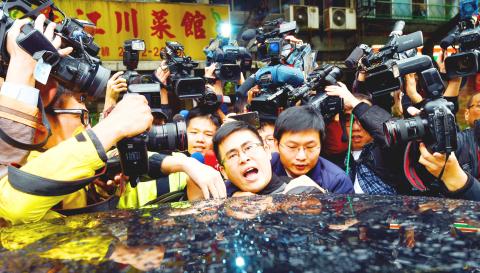Prominent news personality Wang Ping-chung (王炳忠) and three other New Party youth wing leaders were detained for questioning yesterday, as part of a probe into suspected leaks of classified information in connection with an espionage investigation against Chinese student Zhou Hongxu (周泓旭).
In coordinated actions yesterday morning, Ministry of Justice Investigation Bureau (MJIB) officials, backed up by police officers, served summonses and conducted searches at Wang’s home in Taipei and at the residences of other New Party youth wing executives Ho Han-ting (侯漢廷), Lin Ming-cheng (林明正) and Chen Ssu-chun (陳斯俊).
The officials had search warrants, summons notifications and arrest warrants for Wang and his New Party colleagues, and the operation was carried out in accordance with legal procedures, they said.

Photo: Peter Lo, Taipei Times
Wang, the New Party spokesman and head of its youth member committee, is known for his outspoken pro-China views and has made frequent trips to China, often appearing as a political commentator on Chinese state media.
Officials dispatched to search Wang’s home said they had to call a locksmith to gain entry after Wang stalled them for about an hour by refusing to open the door.
Wang tried to call his lawyer, as he began filming what was taking place for an online live broadcast.
After gaining entry, officials served summonses and warrants for Wang and his father, and they were taken for questioning at the MJIB headquarters in New Taipei City.
The same was done with Wang’s colleagues.
Taipei prosecutor Lin Chun-ting (林俊廷) headed yesterday’s investigation, as he is also in charge of the investigation of Zhou, who was convicted in September for trying to obtain classified information and recruit people for a spy network.
The Taipei District Prosecutors’ Office later released a statement saying that Wang and other people of interest were being investigated on suspicion of violating the National Security Act (國家安全法) in relation to Zhou’s case.
Except for Chen Ssu-chun, the other three had just returned from China on Saturday, as they had accompanied New Party Chairman Yok Mu-ming (郁慕明) and Taipei City Councilor Chen Yen-po (陳彥伯) on an official visit to China.
Chen Yen-po yesterday confirmed that the New Party delegation held a number of meetings with executives at China’s Taiwan Affairs Office, and that they had visited Beijing, Shanghai, Nanjing and other Chinese cities.
Regarding Zhou’s case, the investigation had earlier revealed that Wang had become friends with Zhou when the Chinese student was active in universities and social circles in getting to know more people and government officials prior to his arrest and conviction.
The two had been seen attending the same events.
It was alleged that Wang had played a key role by introducing Zhou to Taiwanese government officials and acting as an intermediary for Zhou’s activities.
Chen Ssu-chun and Lin Ming-cheng were listed as witnesses, and transferred to the Taipei District Prosecutors’ Office for further questioning at about 7pm yesterday, while Wang and Ho were still being questioned at MJIB as of press time last night.
Zhou, who is under detention, was also summoned by prosecutors last night, as officials said they might arrange for Zhou and Wang to testify and be cross-examined as part of the investigation into the case.

SECURITY: As China is ‘reshaping’ Hong Kong’s population, Taiwan must raise the eligibility threshold for applications from Hong Kongers, Chiu Chui-cheng said When Hong Kong and Macau citizens apply for residency in Taiwan, it would be under a new category that includes a “national security observation period,” Mainland Affairs Council (MAC) Minister Chiu Chui-cheng (邱垂正) said yesterday. President William Lai (賴清德) on March 13 announced 17 strategies to counter China’s aggression toward Taiwan, including incorporating national security considerations into the review process for residency applications from Hong Kong and Macau citizens. The situation in Hong Kong is constantly changing, Chiu said to media yesterday on the sidelines of the Taipei Technology Run hosted by the Taipei Neihu Technology Park Development Association. With

CARROT AND STICK: While unrelenting in its military threats, China attracted nearly 40,000 Taiwanese to over 400 business events last year Nearly 40,000 Taiwanese last year joined industry events in China, such as conferences and trade fairs, supported by the Chinese government, a study showed yesterday, as Beijing ramps up a charm offensive toward Taipei alongside military pressure. China has long taken a carrot-and-stick approach to Taiwan, threatening it with the prospect of military action while reaching out to those it believes are amenable to Beijing’s point of view. Taiwanese security officials are wary of what they see as Beijing’s influence campaigns to sway public opinion after Taipei and Beijing gradually resumed travel links halted by the COVID-19 pandemic, but the scale of

A US Marine Corps regiment equipped with Naval Strike Missiles (NSM) is set to participate in the upcoming Balikatan 25 exercise in the Luzon Strait, marking the system’s first-ever deployment in the Philippines. US and Philippine officials have separately confirmed that the Navy Marine Expeditionary Ship Interdiction System (NMESIS) — the mobile launch platform for the Naval Strike Missile — would take part in the joint exercise. The missiles are being deployed to “a strategic first island chain chokepoint” in the waters between Taiwan proper and the Philippines, US-based Naval News reported. “The Luzon Strait and Bashi Channel represent a critical access

Pope Francis is be laid to rest on Saturday after lying in state for three days in St Peter’s Basilica, where the faithful are expected to flock to pay their respects to history’s first Latin American pontiff. The cardinals met yesterday in the Vatican’s synod hall to chart the next steps before a conclave begins to choose Francis’ successor, as condolences poured in from around the world. According to current norms, the conclave must begin between May 5 and 10. The cardinals set the funeral for Saturday at 10am in St Peter’s Square, to be celebrated by the dean of the College